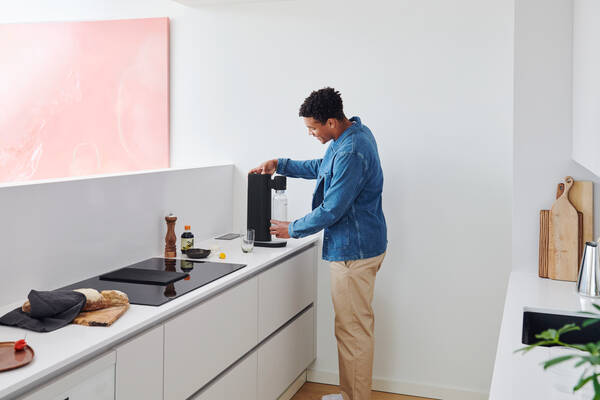
UPM Biocomposites and Finnish company Mysoda have developed a household appliance almost completely based on renewable raw materials. The bio-based sparkling-water maker arrived on the market in October in Finland and several other European countries.
The appliance is made of the UPM Formi EcoAce biocomposite, which in turn is made of wood fibre and UPM BioVerno naphtha. The new material replaces oil-based plastic in the body of the sparkling-water maker.
The properties of the biocomposite correspond to those of fossil plastics, and it can be worked using similar technologies and machinery. The look and feel of the material resemble those of wood, since the wood fibres give the appliance a natural finish. Because the biocomposite is manufactured from forest industry sidestreams, such as tall oil, sawdust and wood chips, the production does not increase forest fellings.
‘Intensive collaboration from the original idea to the design and materials resulted in a completely novel product concept. Our shared journey and the innovations arrived at have been extremely interesting,’ says Ralf Ponicki, Director of UPM Formi. He stresses that the excellence of the biocomposite is due to its strength and small carbon footprint.
Thanks to the renewable raw material, the carbon footprint of the product can be reduced by up to 50–70 percent, depending on how the comparison is made. The material is also recyclable. For cost efficiency, it also had to suit the injection moulding technology.
The raw material used in Mysoda’s sparkling-water maker comes from Finland, while the appliance itself is manufactured in China.
‘We are taking a big leap in presenting the consumes with an ecologically sustainable alternative,’ says David Solomon, CEO of Mysoda. He points out that according to Statista.com publishing consumer and market information, 715 million pieces of household appliances will be sold in Europe in 2025, most of them being made of fossil plastics.
According to Solomon, this year the figure will be 640 pieces. In Finland, the figure was 2.7 million last year.
‘Initially, we began to ponder whether the plastic could be replaced by wood. We wanted to challenge every single component in the manufacturing and try to make them as ecologically as possible, while still producing a durable and aesthetically pleasing item.’
Solomon hopes that other appliance manufacturers will follow suit.